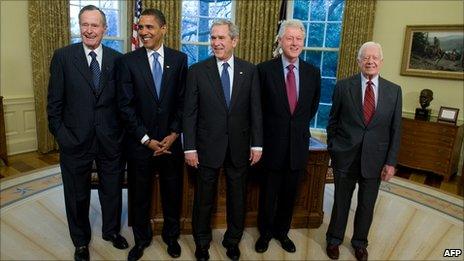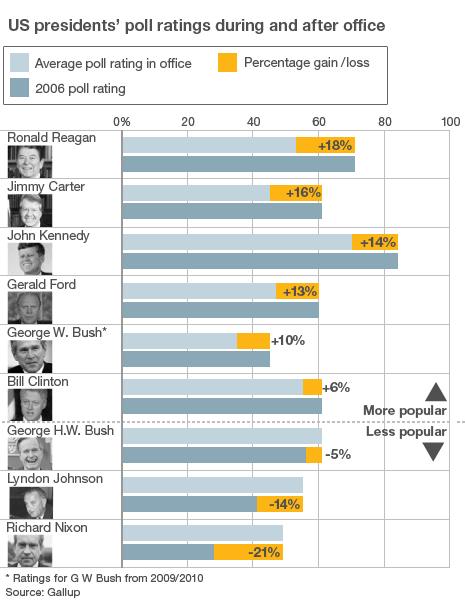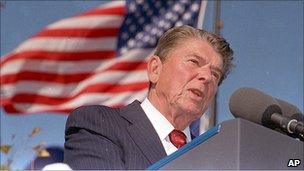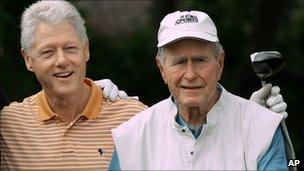George W Bush memoir: How to rehabilitate a president
- Published

Five presidents met in the Oval Office in January 2009, living proof of the active post-White House lives that presidents now lead
As President George W Bush's memoir hits US bookstores, it seems that the American public is now viewing his presidency in a more favourable light. The BBC's Katie Connolly explores why Americans look so fondly on their former leaders.
When George W Bush boarded the presidential helicopter for the final time on a frosty January morning in 2009, the crowds gathered on the Washington Mall for Barack Obama's inauguration booed and yelled colourful epithets as his chopper passed overhead.
Mr Bush was deeply unpopular at the time. While his approval rating after the 9/11 attacks was the highest in history, by October 2008, his favourability had tumbled to a low of 25%.
Now, less than two years after he left office, Americans appear to be looking upon Mr Bush a little more fondly.
According to Gallup polling data, external, Mr Bush's approval ratings have increased by 10 points - from 35% to 45% - in the 18 months following January 2009.
In an October poll, CNN found that only 47% of Americans thought Mr Obama was a better president than Mr Bush, compared to 45% who favoured Mr Bush. In 2009, Mr Obama was preferred by a margin of 23 points.
"The perspective of time is already softening the once harsh edges of judgment on the legacy of President George W Bush," former Bush adviser Mark McKinnon recently wrote on The Daily Beast, external. "Torn by worry, folks long for his steadying hand. They miss his warmth and empathy."
Even Maureen Dowd, the New York Times columnist whose rapier pen dripped scorn on the Bush administration at every opportunity, recently expressed, external a desire to hear Mr Bush speak out against Islamophobia.
This week, Mr Bush is embarking on a series of heavily anticipated television interviews - his first since leaving office - to promote his new memoir, which has an enormous first print run of 1.5m, indicating that his publisher expects strong sales.
Has Mr Bush rehabilitated his image already?
Ultimate celebrity
For presidential historians, Mr Bush's slowly ascending post-presidential approval ratings aren't surprising in the least. Almost every president has had a similar revision.

Presidential biographer Doug Brinkley, who has chronicled the presidencies of Jimmy Carter, Gerald Ford and Theodore Roosevelt, says that "a kind of nostalgia for a different time starts settling in" after a president leaves office.
"What you remember about these presidents is that you lived with them for a period of time. Partly, you remember that era when you were younger," Doris Kearns Goodwin, a Pulitzer Prize winning presidential historian, told the BBC.
"Maybe there is a desire to look more kindly on ex-presidents because it makes you feel better about the country."
Mr Brinkley says the tendency to revere presidents once they've left office is part of a peculiarly American "celebrity culture" where presidents are the ultimate celebrity - members of the most elite club of all, their autographs and photographs sought after.
"We have a kind of cult of the presidency: their birthplaces, where they lived, any place with presidential associations becomes a national historical site," Mr Brinkley points out.

Ronald Reagan had a remarkable rise in popularity following his presidency
He also says that America's defiant individualism works in favour of ex-presidents even as it dogs sitting presidents.
"We build up the individual so much that they get all the credit and all the blame," he says. In remembering, Americans tend to subjugate the larger forces of history to the force of the individual.
For example, Ronald Reagan is often solely credited with winning the Cold War even though complex political and social dynamics were at play.
Similarly, while in the White House, presidents bear the brunt of the nation's woes, as Mr Obama quickly discovered.
"When they're in office, we brutalize our presidents," Mr Brinkley says. "We're a very impatient society. We tend to blame presidents if the economy is bad or unemployment is high - it's always the president's fault."
International status
Most modern ex-presidents occupy their first years out of office by writing their memoirs and raising money for a presidential library.
Bill Clinton, George Bush Sr, and Jimmy Carter have also worked on international problems, like disaster relief, effectively elevating their stature above the struggle of partisan politics.
"When Bush (Sr) and Clinton got together after disasters like the Tsunami, people loved it. They loved the thought that somehow the presidents know they belong to an exclusive club and can connect to each other in a way they never could when they ran against each other," Ms Goodwin says.
Jimmy Carter's active post-presidency has cut both ways - some laud his human rights work while others find his outspoken defence of Palestine and his criticisms of Mr Clinton and Mr Bush (Jr) unstatesmanlike.
American pundits almost universally agree that Mr Bush's decision to remove himself from the spotlight for the past two years was an excellent one, and a move which has heightened media interest in his remarks this week.
"If he had been speaking every month or if he had taken a partisan dig at the Democrats then his memoir would have lost its presidential stature," Ms Goodwin says.
Brand marketing
But, as with most things in politics, this Bush revival hasn't occurred without a team behind the scenes. Every move Mr Bush makes this week has been carefully choreographed by media consultants and communications experts.

Mr Clinton and Mr Bush have worked together on international disaster relief
"Everything is about branding. Presidents can leave office with a tarnished brand but they have the power of name recognition," says Mr Brinkley. "Professionals have created a launch, like you do with a motion picture or a football game. You create the zeitgeist."
He says those presidents with anaemic post-White House ratings have had poor brand management, while those acolytes working to create the Reagan or Kennedy legacies have done an astounding job.
They have encouraged biographies and documentaries, and helped other senior officials in their respective administrations plan memoirs, all with the aim of bolstering legacy.
"They have done an amazing job of brand control and kept the icon beloved," Mr Brinkley says, adding that George Bush Sr has explicitly rejected such brand management and shunned attention, partly because of his son's political career and partly because of his self-effacing nature. His reputation has suffered as a result.
Richard Nixon has the albatross of White House tapes hanging around his neck, where he can still be heard speaking negatively about African Americans, Mexicans and Jews.
Lyndon Johnson has become synonymous with the disastrous Vietnam War. But both Mr Brinkley and Ms Goodwin agree that as the Vietnam generation fades, Mr Johnson will be remembered more for his historic social achievements including civil rights, Medicare, environmental protection and public broadcasting, and his stature will increase dramatically.
"The reality is that we have all sorts of second acts in America," says Mr Brinkley.
Mr Bush, who often remarked that history will be his judge, might well agree.
- Published9 November 2010
- Published8 November 2010
- Published3 November 2010